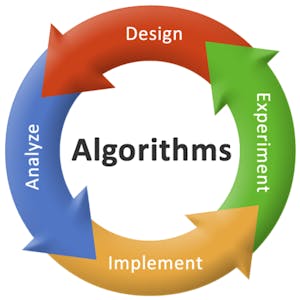Graph Search, Shortest Paths, and Data Structures
The primary topics in this part of the specialization are: data structures (heaps, balanced search trees, hash tables, bloom filters), graph primitives (applications of breadth-first and depth-first search, connectivity, shortest paths), and their applications (ranging from deduplication to social network analysis).
None
Syllabus
Syllabus - What you will learn from this course
Week 1
Week 1
Week 2
Week 2
Week 3
Week 3
Week 4
Week 4
FAQ
When will I have access to the lectures and assignments?
Access to lectures and assignments depends on your type of enrollment. If you take a course in audit mode, you will be able to see most course materials for free. To access graded assignments and to earn a Certificate, you will need to purchase the Certificate experience, during or after your audit. If you don't see the audit option:
The course may not offer an audit option. You can try a Free Trial instead, or apply for Financial Aid.
The course may offer 'Full Course, No Certificate' instead. This option lets you see all course materials, submit required assessments, and get a final grade. This also means that you will not be able to purchase a Certificate experience.
What will I get if I subscribe to this Specialization?
When you enroll in the course, you get access to all of the courses in the Specialization, and you earn a certificate when you complete the work. Your electronic Certificate will be added to your Accomplishments page - from there, you can print your Certificate or add it to your LinkedIn profile. If you only want to read and view the course content, you can audit the course for free.
Is financial aid available?
Yes. In select learning programs, you can apply for financial aid or a scholarship if you can’t afford the enrollment fee. If fin aid or scholarship is available for your learning program selection, you’ll find a link to apply on the description page.
Reviews
Very useful information for thorough programmers. Especially liked analysis of hash tables implementation and handling collisions in real applications.
Focused on principles and motivations behind algorithms. You might forget an algorithm you learned, but you will definitely be able to come up with one quickly after this course.
There is very little hand-holding in this course and no code provided. This really challenges you to implement the ideas taught in the most efficient and appropriate manner possible.
Learning algorithms is a must for all computer scientists. This course propels you on the path and kindles the spirit of inquiry and knack for finding better solutions.
